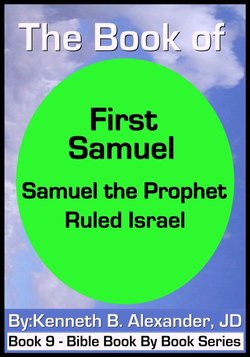Читать книгу The Book of First Samuel - Samuel the Prophet Ruled Israel - Kenneth B. Alexander JD - Страница 7
На сайте Литреса книга снята с продажи.
Introduction to Samuel the Prophet and School of Prophets
ОглавлениеSamuel was the first real prophet to rule Israel. He had the unique ministry of being a prophet, a judge and a priest. He established schools of prophets, training young prophets for the purpose of guiding Israel. He, and his prophets, controlled the spiritual realm in Israel and no major decisions were made except by his consultation. When Israel clamored for a King to lead them Samuel anointed the first two Kings of Israel being Saul and David. When Saul proved to be a rebellious King, he anointed David while Saul was still reigning. When Saul proved unworthily to be King, Samuel befriended and protected David as Saul sought to kill him. He was a great man of God who lived his life in constant communication with the Lord and doing what was best for the nation.
The author of the Books of Samuel (1 & 2) is unknown. However the author had to be someone contemporary with Samuel as the deeds of Samuel are scrupulously recorded. A main point of the Book is the unwise decision, according to Samuel, of Israel to desire a King instead of allowing God to lead them. However God turned this unwise decision to His glory by anointing David as King, the man after God’s heart. During the time of Samuel the Kingdom of Israel began to become united after a period when the nation was reduced to people doing what was right in their own sight without consulting God. The unifying of the nation was accomplished finally by David when he took the throne.
Prophet (Heb. Nabi) comes from a root meaning “to bubble forth, as from a fountain,” hence “to utter”. This is reminiscent of Jesus words: “If anyone is thirsty, let him come to Me and drink. “He who believes in Me, as the Scripture said ‘From his innermost being will flow rivers of living water’ ” (John 7:37-38). This Hebrew word is the first and the most generally used for a prophet. In the time of Samuel another word, ro<eh, “seer”, began to be used (1Sam. 9:9). It occurs seven times in reference to Samuel. Afterwards another word, hozeh, “seer” (2 Sam. 24:11), was employed.
The “prophet” proclaimed the message given to him by God. As the “seer” the prophet beheld the vision of God and spoke it into existence. To that extent a “seer prophet” was not foretelling so much as he was creating the future. The :seer” can prophesy into existence what he “sees”. This creative aspect of a prophet’s ministry is the most important. A prophet moves as God moves by creating something out of nothing by a word (Genesis 1:1-3). Hebrews says: “By faith we understand that the worlds [ages] were prepared [framed, KJV] by the word of God, so that what is seen was not made out of things which are visible” (11:3). A prophet has the ability, by speaking God’s word, to create, or bring into being, that which heretofore didn’t heretofore exist. The prophet was a spokesman for God; he spoke in God’s name and by his authority (Ex. 7:1). He was the mouth by which God spoke to men (Jer. 1:9; Isa. 51:16), and hence what the prophet says is not from man but from God (2 Pet. 1:20, 21). The Bible is composed of the writings of men speaking by a revelation from God.
But while the prophetic gift was exercised from the beginning, the prophetic order began with Samuel. Colleges, “schools of the prophets”, were instituted for the training of prophets. The main purpose of the prophets of Israel were to maintain the Holy, Godly atmosphere in the nation. As such they constituted a distinct order with a specific mission to perform (1 Sam. 19:18–24; 2 Kings 2:3, 15; 4:38), which continued to the close of the Old Testament. Such “schools of prophets” were established at Ramah, Bethel, Gilgal, Gibeah, and Jericho. The “sons” or “disciples” of the prophets were men (2 Kings 5:22; 9:1, 4) who lived together at these different “schools” (4:38–41). These men were taught not only the rudiments of secular knowledge, but they were brought up to exercise the office of prophet, “to preach true righteousness and correct worship of Jehovah”. They represented a spiritual force that actually controlled the spiritual atmosphere in Israel. To come into their presence was to come into the presence of the Lord.
Even the angriest of men would speak the word of the Lord in their presence. When Saul was very angry at David he went to Ramah in search of him. At Ramah, in the presence of the prophet, “the Spirit of God came upon him also, so that he went along prophesying continually until he came to Naioth in Ramah. He also stripped off his clothes, and he too prophesied before Samuel and lay down naked all that day and all that night. Therefore they say, “Is Saul also among the prophets?” (1Sa 19:23-24). The school of prophets was the first example of a group of men who obtained a oneness with each other so that they all saw the same vision and prophesied as one voice. So important were the prophets to God that he said through Amos: “Surely the Lord God does nothing Unless He reveals His secret counsel To His servants the prophets” (Amos 3:7).
